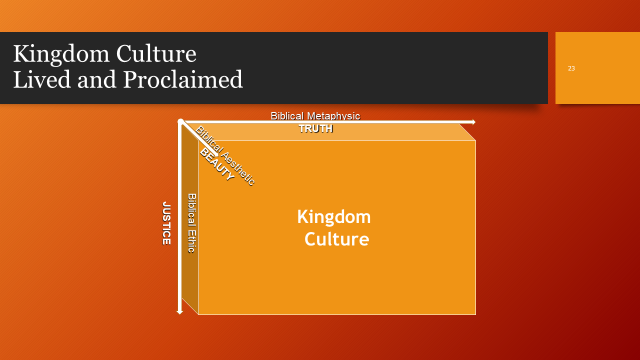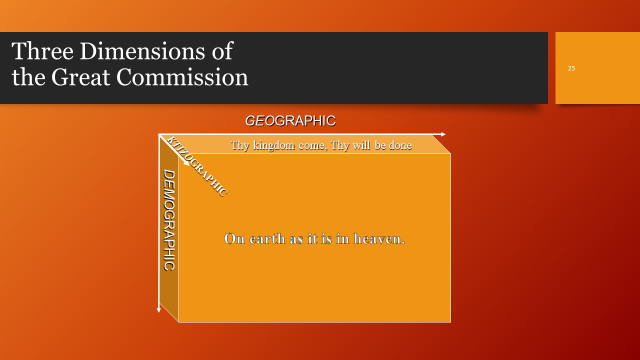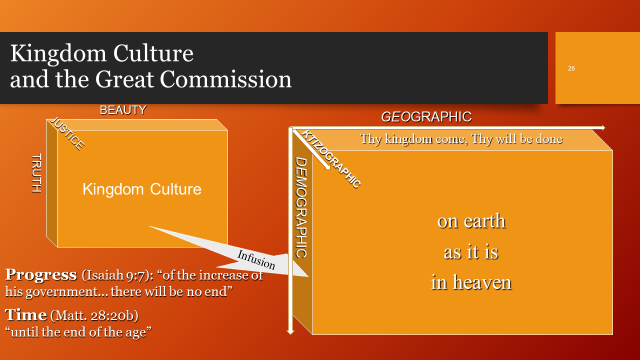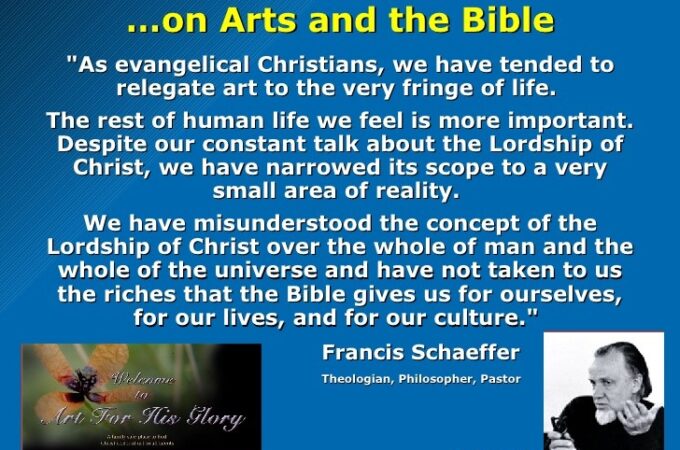Christians are generally familiar with Jesus’ mandate for the church, but fewer Christians are familiar with the Cultural Commission. Fewer still see the connection between these two commissions. Yet neither has been rescinded. On the contrary, both remain active expressions of God’s purpose for humans.
We must reconnect the Cultural Commission and the Great Commission. Christ’s death and resurrection led directly to the Great Commission but also reawakened the Cultural Commission.
Four major stages in human history—creation, fall, redemption, and consummation—are captured by the biblical narrative. These frame God’s purpose for humans.
Creation – When God finished His creation it was perfect but not complete. Creation waited for God’s vice-regents to develop its potential. Humans, made in God’s image, used their creativity and intelligence to name and rule over the animals, fill the earth with image bearers, work the garden, plant vineyards and orchards, and create music, art, poetry, and dance. In short, human beings filled the earth with the knowledge, glory, and beauty of God—in essence, they created culture. This is the first mandate given to humans by God—the Cultural Commission.
Fall – Genesis 1 shows us that God’s creation was good; humans were given all the necessary faculties to exercise the Cultural Commission. Genesis 3 shows us that humanity’s rebellion against God brought a new reality and the distortion of culture. Evil entered the world in three forms: personal evil, such as murder and adultery; natural evil, such as earthquakes, floods, and droughts; and institutional evil, such as slavery, corporate corruption, and caste systems.
Personal renewal precedes cultural renewal
After the fall, human behavior became wildly destructive. “Sin entered the world through one man, and death through sin, and in this way death came to all men, because all sinned” (Rom. 5:12). To renew the world, to renew culture, people needed personal renewal.
Redemption – Humanists believe that the evils of the world can be overcome by human virtue and goodness, that humans have the power to bring about good and just societies. Christians, however, acknowledge that human depravity must be addressed at a deeper level, which only God can do. Centuries before the coming of Christ, the prophet Isaiah spoke of God’s redemptive work in Christ and the renewal of humanity: “He poured out his life unto death, and was numbered with the transgressors. For he bore the sin of many, and made intercession for the transgressors” (Isa. 53:12).
Christ gave the disciples the Great Commission in light of his death and resurrection and the sending of the Holy Spirit after Christ’s ascension. Christ and the Spirit  empower Christians to partner in God’s mission on earth.
empower Christians to partner in God’s mission on earth.
The Great Commission specifically takes into account and exists because of the fall, and the redemption provided by Christ. Its purpose leads to the final stage of history.
Consummation – The end of history will be marked by the ingathering of the nations. God’s royal vice-regents are to create culture and ultimately bring the godly fruit of their nation’s culture into the consummated kingdom. We are to live with the end in mind, the coming of Christ and his kingdom. This incredible reality is to frame my life and yours.
Two commissions, one purpose
Now we can connect the first and second commissions. The Cultural Commission is to create culture; the Great Commission is to create kingdom culture, characterized by truth (reflecting God’s physical and metaphysical laws), goodness (reflecting God’s moral laws), and beauty (reflecting God’s aesthetic laws).
 These three elements of kingdom culture connect with the three dimensions of the Great Commission. For many years I viewed the Great Commission as one-dimensional: “Go into all the world, preach the gospel, and save souls for heaven.” Then I began to study the three main Great Commission passages and found that it is actually multidimensional, like a three-sided prism that refracts differently as the light shines on it from varying directions.
These three elements of kingdom culture connect with the three dimensions of the Great Commission. For many years I viewed the Great Commission as one-dimensional: “Go into all the world, preach the gospel, and save souls for heaven.” Then I began to study the three main Great Commission passages and found that it is actually multidimensional, like a three-sided prism that refracts differently as the light shines on it from varying directions.
The first dimension, found in Acts 1:8, presents the geographic commission. The gospel will go around the world from Jerusalem to Judea to Samaria to the ends of earth. This represents the breadth of the mission and reflects a horizontal movement. The second dimension, in Matthew 28:19, presents the demographic commission. Here the gospel is to penetrate culture, pointing to the depth of the mission to all ethnē (peoples) and to every sector of society. This is the vertical dimension. The third dimension, in Mark 16:15, presents what I call the ktizographic  commission (ktizō in Greek relates to creating and creation): “He said to them, ‘Go into all the world and preach the gospel to all creation.’” The gospel has implications for the creation that is awaiting redemption. This reflects the extent of the commission—to all creation.
commission (ktizō in Greek relates to creating and creation): “He said to them, ‘Go into all the world and preach the gospel to all creation.’” The gospel has implications for the creation that is awaiting redemption. This reflects the extent of the commission—to all creation.
The Great Commission follows and builds on the Cultural Commission
The demographic dimension of the Great Commission must be understood in light of the Cultural Commission of Genesis. At this intersection we find the reawakening of the Cultural Commission in the Great Commission. The church can positively influence the building of healthy, prosperous, and free societies only by recovering her grasp of the Cultural Commission.
By focusing on the geographic dimension of the Great Commission as found in Acts 1:8, the evangelical church has lost sight of the Cultural Commission. As a result, we have more Christians, churches, and Christian organizations than ever before, but less impact than ever on shaping and transforming culture. Our societies are terribly broken, and we are rapidly damaging our earthly home. When God’s people disconnect the Great Commission from the Cultural Commission, they abbreviate the task to evangelism, personal spiritual discipleship, and church planting. These are essential but not sufficient to the fulfillment of either commission. As Notre Dame sociologist Christian Smith warns, “Worthy as these projects may be, none of them attempt to transform social or cultural systems, but merely to alleviate some of the harm caused by the existing system.” Such solutions fall short of making a lasting difference.
The Great Commission reestablishes the Cultural Commission
Th e Great Commission does not replace the Cultural Commission— it reestablishes it. Both are part of God’s comprehensive redemptive plan for creation. The Great Commission calls us to announce the lordship of the risen and sovereign Christ over all creation and to teach nations to obey all that Christ commanded. It highlights the power and presence of God necessary to clarify our view of the world and rectify the evils we see and do. The Culture of the Kingdom, Truth, Beauty and Goodness are to be infused into each element of the Great Commission, the geographic, demographic and ktizographic. This is a process of enculturation, it is progressive and it will only be completed when Christ returns at the end of history.
e Great Commission does not replace the Cultural Commission— it reestablishes it. Both are part of God’s comprehensive redemptive plan for creation. The Great Commission calls us to announce the lordship of the risen and sovereign Christ over all creation and to teach nations to obey all that Christ commanded. It highlights the power and presence of God necessary to clarify our view of the world and rectify the evils we see and do. The Culture of the Kingdom, Truth, Beauty and Goodness are to be infused into each element of the Great Commission, the geographic, demographic and ktizographic. This is a process of enculturation, it is progressive and it will only be completed when Christ returns at the end of history.
The Cultural Commission explains what every human is hardwired to do every day. It is the “human job description.” God’s children, empowered by Christ’s resurrection life and indwelt by the Holy Spirit, can now fulfill the Cultural Commission as God originally intended. We must recognize the power we have been given to carry out God’s mission on earth. Every Christian has a role to play in creating culture and discipling nations, which is the primary task of the Great Commission.
- Darrow Miller
This DM&F Classic blog post is excerpted/adapted from the book Emancipating the World. For the entire text go here.






